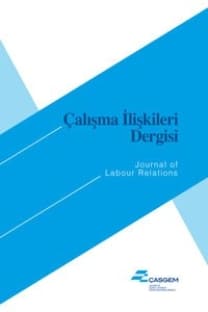Toplu İş Sözleşmesi Düzeninde Kazanılmış Hak Kavramı
Sanayi devriminin başlangıç yılı ne olursa olsun üretimde makinenin kol gücü yerine kullanılması ile birlikte çalışma ilişkileri kökten değişmiştir. Eskinin takas ekonomisi, yerini kitle üretimine bırakmış ve bu üretim biçimi de iş ilişkilerini yeni baştan dizayn etmiştir. Ancak, sanayi devrimi ile birlikte ortaya çıkan yeni iş ilişkileri konusunda hemfikir olunan gerçek; sanayileşmenin ilk yıllarında yaşanan kötü çalışma koşullarıdır. Bugüne kadar konuya ilişkin yapılan tüm çalışmalarda, o dönemde yaşanan ilişkilere değinilerek bir kıyaslama yapılmaktadır. Bu kötü çalışma koşullarına karşı başlatılan mücadeleler ilerleyen dönemlerde çalışma ilişkileri literatüründe “işçi lehine şart ilkesi” gibi bir kavramın oluşmasına da neden olmuştur. Buna göre işçinin çalışma ilişkisinin zayıf tarafını oluşturması, onun korunması ilkesini de beraberinde getirmiştir. Gerçekten de sanayinin ilk yıllarında sadece emeği ile geçinen hatta sadece kendi emeği yetmeyen, beraberinde eşini, çocuğunu da çalıştırmak zorunda kalan işçiler bu dönemde çok kötü şartlarla mücadele etmek zorunda kalmışlardır. Bu sürecin ardından kazanılan her yeni hak işçiler için bir eşik olmuş ve kazanılmış olan bu haklardan daha geriye gitmek gibi bir durumun söz konusu olmayacağı ilkesi benimsenmiştir. Ülkemizde, toplu iş sözleşmesi düzenine geçildiği 1963 yılından günümüze kadar işçi sendikalarınca birçok toplu iş sözleşmesi bağıtlanmış ve her sözleşme döneminde elde edilen ekonomik ve sosyal haklar bir sonraki dönemin taban kriterleri olarak kabul edilmiştir. İşçi sendikalarınca bu kabulün temel dayanağı “işçi lehine şart ilkesi” ne dayandırılmıştır. Ancak dünyadaki küreselleşme ve bölgesel bütünleşme hareketleri ile birlikte işgücünün ve işletmelerin yapısı büyük değişimlere uğramıştır. Çalışmamızda, ülkemizi de içine alan bu değişim ve dönüşüm olgusunun toplu iş sözleşmesi müzakerelerinde tarafların günün şartlarına uygun koşulları içeren tekliflerle bir araya gelmeleri konusundaki yaklaşımları konuya ilişkin uygulama örnekleri ile yargı kararları birlikte ele alınarak incelenecektir. İşçi sendikalarının işin ve işyerinin/işletmenin devamlılığı için söz konusu değişimlere uygun pazarlık stratejileri geliştirip geliştirmediği çalışmamızın temel araştırma konusunu oluşturmaktadır.
The Entitled Rights on Collective Labour Agreements System
The industrial relations were evolved wholly by the utilization of machinery instead of manual work regardless of the first year when the industrial revolution had begun. The ancient barter economy was replaced by mass production and this production method has redesigned the working relationships. However, after initiation of industrial revolution the only reality accepted by everyone was the bad working conditions during the first years of industrialization. Up till now, all studies on this subject compare the working conditions existing on these days. The challenges against these bad working conditions were lead to the introduction of a concept like “worker favorable conditionality principle” in the industrial relations literature. Accordingly, the existence of worker as the weak party in employment relationship necessitated the principle for the protection of worker. In reality, the workers who based on their manual work for living or in addition to that who based on theirs and their spouses’ and children’s work for living must have been encountered with harsh conditions in this period. The rights acquired following this struggle was constituted a threshold and the principle on the entitled rights which were not been taken back was adopted. In our country, after the introduction of collective labour agreements in 1963 several collective agreements were concluded and in each period the economic and social rights included in the previous agreement were deemed as the bottom line for the next agreement. Trade unions were based this approach solely upon the “worker favorable conditionality principle”. Nevertheless the structure of labour force and enterprises were transformed to a greater extent by the globalization and regional integrations. In our study, these transformation and evolution which also covers our country will be assessed with reference to the negotiation positions of parties compliant with the current conditions, practical examples and decisions of Court of Appeals. The main subject of this research will be to determine whether trade unions develop necessary negotiation strategies appropriate to these changes for the existence of workplace/enterprise or not.
